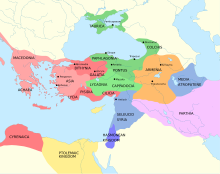
The 1st century BC, also known as the last century BC and the last century BCE, started on the first day of 100 BC and ended on the last day of 1 BC. The AD/BC notation does not use a year zero; however, astronomical year numbering does use a zero, as well as a minus sign, so "2 BC" is equal to "year –1". 1st century AD follows.
Year 102 BC was a year of the pre-Julian Roman calendar. At the time it was known as the Year of the Consulship of Marius and Catulus and the Third Year of Taichu. The denomination 102 BC for this year has been used since the early medieval period, when the Anno Domini calendar era became the prevalent method in Europe for naming years.
Year 101 BC was a year of the pre-Julian Roman calendar. At the time it was known as the Year of the Consulship of Marius and Aquillius and the Fourth Year of Taichu. The denomination 101 BC for this year has been used since the early medieval period, when the Anno Domini calendar era became the prevalent method in Europe for naming years.

Year 100 BC was a year of the pre-Julian Roman calendar. At the time it was known as the Year of the Consulship of Marius and Flaccus and the First Year of Tianhan. The denomination 100 BC for this year has been used since the early medieval period, when the Anno Domini calendar era became the prevalent method in Europe for naming years.

This article concerns the period 49 BC – 40 BC.
This article concerns the period 79 BC – 70 BC.
80s BC is the time period from 89 BC – 80 BC.

This article concerns the period 109 BC – 100 BC.
This article concerns the period 119 BC – 110 BC.
This article concerns the period 149 BC – 140 BC.
This article concerns the period 199 BC – 190 BC.
Year 90 BC was a year of the pre-Julian Roman calendar. At the time it was known as the Year of the Consulship of Caesar and Lupus and the Third Year of Zhenghe. The denomination 90 BC for this year has been used since the early medieval period, when the Anno Domini calendar era became the prevalent method in Europe for naming years.

Year 87 BC was a year of the pre-Julian Roman calendar. At the time it was known as the Year of the Consulship of Octavius and Cinna/Merula and the Second Year of Houyuan. The denomination 87 BC for this year has been used since the early medieval period, when the Anno Domini calendar era became the prevalent method in Europe for naming years.

The Social War, also called the Italian War or the Marsic War, was fought from 91 to 87 BC between the Roman Republic and several of its autonomous allies in Italy. The Italian allies wanted Roman citizenship, not only for the status and influence that came with it, but also for the right to vote in Roman elections and laws. They believed that they should be treated equally to the Romans, given that they had formed cultural and linguistic connections with the Roman civilization, and had been their loyal allies for over two centuries. The Romans strongly opposed their demands, and refused to grant them citizenship, thus leaving the socii with fewer rights and privileges.
Gnaeus Pompeius Strabo was a Roman general and politician, who served as consul in 89 BC. He is often referred to in English as Pompey Strabo, to distinguish him from his son, the famous Pompey the Great, or from Strabo the geographer.
This article concerns the period 99 BC – 90 BC.

The gens Porcia, rarely written Portia, was a plebeian family at Ancient Rome. Its members first appear in history during the third century BC. The first of the gens to achieve the consulship was Marcus Porcius Cato in 195 BC, and from then until imperial times, the Porcii regularly occupied the highest offices of the Roman state.
Marcus Petreius was a Roman politician and general. He was a client of Pompey and like Pompey he came from Picenum a region in eastern Italy. He cornered and killed the notorious rebel Catiline at Pistoia.

Lucius Porcius Cato was a Roman general and politician who became consul in 89 BC alongside Gnaeus Pompeius Strabo. He died at the Battle of Fucine Lake, possibly at the hands of Gaius Marius the Younger.






